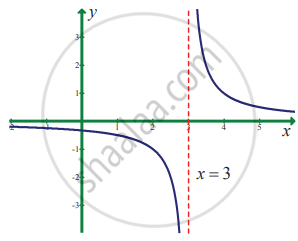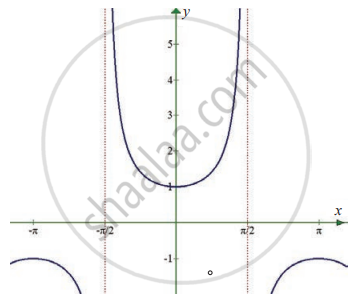Advertisements
Advertisements
Question
Evaluate the following limits:
`lim_(x -> 5) (sqrt(x + 4) - 3)/(x - 5)`
Solution
`lim_(x -> 5) (sqrt(x + 4) - 3)/(x - 5)`
Pu y = x + 4
⇒ x = y – 4
⇒ x – 5 = y – 4 – 5
⇒ x – 5 = y – 9
⇒ y → 5 + 4 = 9
∴ `lim_(x -> 5) (sqrt(x + 4) - 3)/(x - 5) = lim_(y -> 9) (sqrt(y) - sqrt(3^2))/(y - 9)`
= `lim_(y -> 9) (y^(1/2) - (9)^(1/2))/(y - 9)`
`lim_(x -> "a") (x^"n" - "a"^"n") = "na"^("n" - 1)`
`lim_(x -> 5) (sqrt(x + 4) - 3)/(x - 5) = 1/2(9)^(1/2 - 1)`
= `1/2 (9)^(-1/2)`
= `1/2 xx 1/(9^(1/2)`
= `1/2 xx 1/sqrt(9)`
= `1/2 xx 1/3`
= `1/6`
APPEARS IN
RELATED QUESTIONS
Evaluate the following limit:
`lim_(y -> -3) [(y^5 + 243)/(y^3 + 27)]`
Evaluate the following limit:
`lim_(x -> 2)[(x^(-3) - 2^(-3))/(x - 2)]`
Evaluate the following limit :
If `lim_(x -> 5) [(x^"k" - 5^"k")/(x - 5)]` = 500, find all possible values of k.
In the following example, given ∈ > 0, find a δ > 0 such that whenever, |x – a| < δ, we must have |f(x) – l| < ∈.
`lim_(x -> 1) (x^2 + x + 1)` = 3
Evaluate the following :
`lim_(x -> 0) [(sqrt(1 - cosx))/x]`
In exercise problems 7 – 15, use the graph to find the limits (if it exists). If the limit does not exist, explain why?
`lim_(x -> 3) 1/(x - 3)`
In exercise problems 7 – 15, use the graph to find the limits (if it exists). If the limit does not exist, explain why?
`lim_(x -> 0) sec x`
Evaluate : `lim_(x -> 3) (x^2 - 9)/(x - 3)` if it exists by finding `f(3^-)` and `f(3^+)`
Evaluate the following limits:
`lim_(x -> "a") (sqrt(x - "b") - sqrt("a" - "b"))/(x^2 - "a"^2) ("a" > "b")`
Evaluate the following limits:
`lim_(x -> 0)(1 + x)^(1/(3x))`
Evaluate the following limits:
`lim_(x -> oo)(1 + "k"/x)^("m"/x)`
Evaluate the following limits:
`lim_(x -> 0) (tan 2x)/x`
Evaluate the following limits:
`lim_(x -> pi) (1 + sinx)^(2"cosec"x)`
Evaluate the following limits:
`lim_(x -> 0) (sqrt(2) - sqrt(1 + cosx))/(sin^2x)`
Evaluate the following limits:
`lim_(x -> 0) (sqrt(1 + sinx) - sqrt(1 - sinx))/tanx`
`lim_(x -> 0) (sin 4x + sin 2x)/(sin5x - sin3x)` = ______.
`lim_(x→0^+)(int_0^(x^2)(sinsqrt("t"))"dt")/x^3` is equal to ______.
The value of `lim_(x rightarrow 0) (sqrt((1 + x^2)) - sqrt(1 - x^2))/x^2` is ______.
